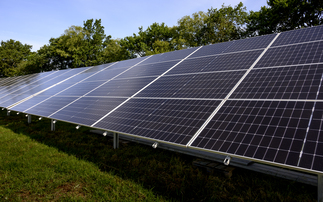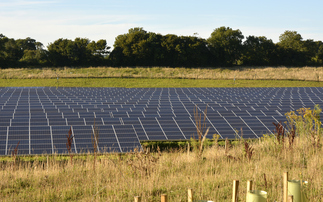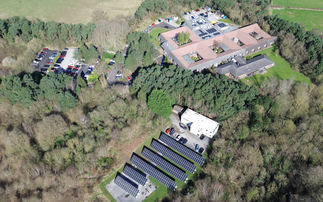Seb Berry of Solarcentury warns large scale solar PV projects will not be able to go ahead unless the government ends its "bonkers" approach to the technology
Seven years ago, during the messy transition period between the old solar PV grant programmes, a senior official summed up Whitehall's historic view of the technology by telling us that "PV ticks all the boxes but unfortunately it is just so expensive". Fast forward to the recent consultation on PV banding in the Renewables Obligation (RO) and despite all price fall evidence to the contrary, it seems that old habits die very hard.
Despite warm Ministerial words, the 22GWp "ambition" for 2020, price falls of 70 per cent since 2010, and PV at scale already delivering levelised costs at or below that of offshore wind, there is no sign that DECC is now going to embrace PV as a cost-effective contributor to the UK's 2020 renewables and carbon targets. Indeed, the reverse is true. We searched in vain for the section in the PV RO banding consultation document talking up the cost-effective contribution that can be made by a technology that has already delivered the 2020 levelised costs predicted for it in the 2011 Renewables roadmap.
Over the years we've learnt the hard way that the most important part of any consultation is the detailed impact assessment that accompanies it, usually published late and always containing illuminating insights into what really lies behind the headline figures in the formal consultation document. And as readers of BusinessGreen will know only too well the RO banding consultation proved no exception to that rule.
The DECC Impact Assessment published alongside the consultation spelt out that a Renewables Obligation Certificate (ROC) level of 1.9 per MWh in 2013/14 would incentivise just 20 per cent of the potential market next year at a subsidy level below that of 2 ROC offshore wind, ie the current marginal technology required to deliver the 2020 target. That message is consistent with our own lobbying position that large-scale PV needs an absolute minimum of 1.8 ROCs next year for any sort of market to survive.
Not for the first time since the election, the PV industry, uniquely of all renewable technologies is saying to Ministers "please Minister, do cut our level of subsidy, but can you do so sensibly". Instead, the department proposed ROC levels which they expect may deliver literally no large-scale PV installations not just next year, but the year after that, and indeed the year after that.
DECC are proposing feed-in tariff (FIT) equivalent RO rates which, for example, delivered just one new >50kWp installation in the whole of August and which they know to be of zero interest to investors. This is bonkers. Apart from anything else how is that consistent with the Government's pledge to focus on "value for money" for consumers within the RO? This "FIT equivalent" policy for large-scale PV, if confirmed, will strangle the life out of a cheaper technology than offshore wind just at the point at which it can start making a meaningful contribution.
The answer of course is that it is far from consistent, but the department has in effect already boxed itself in and does not know how to get itself out of a hole of its own making.
In July, Ed Davey said that the Renewables Obligation settlement announced for all other technologies would deliver the "most cost-effective package for consumers" and that "we will retain our focus on ensuring value for money". He then explained that regardless of the outcome of the PV review that "would not affect the package I am announcing today which will play a key role in securing the UKs energy security at reduced costs to consumers". So there we have it. DECC decided three months ago on its preferred "package" of technologies within the RO for delivering the 2020 target, squeezing out the potential of any other technology to make a meaningful contribution without raising in its own words, a "threat to the RO budget".
Now that PV has delivered what successive departments have spent a decade and more telling us that they want it to do, ie cost-effectiveness against non-onshore wind technologies, it's time for the Whitehall mind-set to change once and for all.
There have been encouraging signs since the FITs debacle of last Winter led by Greg Barker, but the RO proposals have undermined that positive process and once more raise a fundamental question - if the Government is not prepared to get behind this technology at the point at which it becomes cheaper than the marginal technology required to deliver the 2020 target as efficiently as possible then will it ever do so?
Announcing that DECC's PV "policy objective" is to set an RO rate which officials know will result in an abrupt stalling of the market and potentially far worse, runs entirely counter to the Minister's own stated 2020 ambitions for this technology.
So if this latest consultation is to be more than an accounting exercise in which the ROC level is set to mirror the large-scale FITs to ensure the most minimal contribution from PV regardless of its cost-effectiveness, Ministers must surely rethink their starting point. Should they choose not to do so Mr Davey will have to stop claiming that the RO package for "mass deployment" technologies announced this summer provides the "most cost-effective package for consumers".
Seb Berry is head of public affairs for Solarcentury
This sponsored content was provided by Solarcentury








